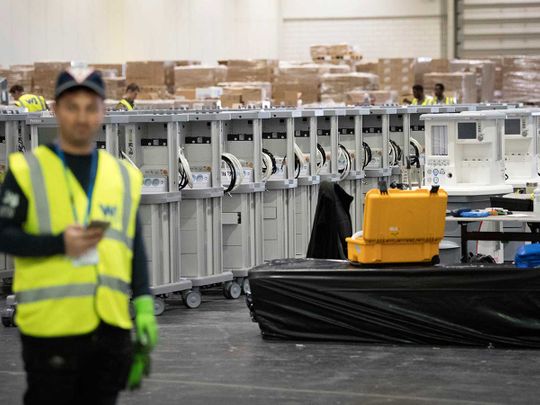
Britons of all camps were desperate for the divisive three-year-long Brexit saga to end.
Tired of the stalemate and the endless arguments in the final analysis most were resolved that Britain should go it alone as evidenced by the election held last July when the Conservative Party won a substantial parliamentary majority.
Prime Minister Boris Johnson was ebullient. This was the chance that he and his cabal of hardline cabinet Leavers had been waiting for; nothing could stop them now.
Let’s be honest, Brexit could not have happened at a worse time. Both Britain and its European partners are preoccupied with trying to contain the virus’ spread
At last Britain would be free to negotiate trade deals with the rest of the world, would save billions in annual payments to Brussels and would be released from EU rules, laws and standards.
Unpatriotic remoaners
With the exception of the pesky unpatriotic ‘remoaners’, captains of industry and bankers wilfully blind to the benefits of quitting the EU, people were either enthusiastic about independence or resignedly hoped for the best.
Johnson was so determined to get Brexit done and dusted that he ruled-out any extension to the transition period beyond December 31, 2020, a decision he was quick to set in legal stone despite the danger of thrusting his nation towards a cliff edge.
But as author P.G. Wodehouse rightly pointed out “just when a fellow is feeling particularly braced with things in general that fate sneaks up behind him with a bit of lead piping”.
Who could have imagined last summer that just about the entire planet would be plagued by an unknown lethal virus leaving over half of humanity forced to remain in their homes!
Only the most foolhardy seer would have dared to predict the dire situation in which some of the world’s wealthiest and most powerful countries find themselves without a rule book to guide them.
As fate leads us through this wholly unchartered territory the only certainty besides the burgeoning death toll is the prospect of a global economic tsunami which Britain is ill-prepared to overcome.
The UK’s economy was already experiencing a slight contraction when the world Corona was associated with a beverage in our minds and it’s been downhill ever since.
Economists advising the Treasury predict massive reductions in annual GDP growth surpassing the Great Depression of 1929. The virus is calling the shots right now, however, when there is a vaccine to bring it under control a swift economic bounce back could be on the cards for many developed nations.
The question is will Britain be among the fortunate in light of the government’s bail out likely to exceed £1 trillion even as companies are going under portending widespread unemployment.
Let’s be honest, Brexit could not have happened at a worse time. Both Britain and its European partners are preoccupied with trying to contain the virus’ spread.
Talking trade deals have been placed on the back burner and, moreover, as the EU’s top negotiators stressed a mere 11 months didn’t provide sufficient time to come up with a deal that often takes up to seven years to conclude.
Flush with success last year Johnson brushed those objections aside announcing the country would be out at this year’s end come what may.
According to a poll conducted by BMG on behalf of the Independent newspaper the great British public is not in agreement now that circumstances have changed.
At least 47 per cent want the PM to extend his self-imposed deadline compared to 23 per cent who say he should stick to his timetable.
Until today cabinet minister are adamant that the withdrawal will be completed by December’s end. In this case brinkmanship is going two ways.
The EU is in no mood to permit a short “flextension” but will consider a longer delay provided Britain lodges a request prior to June.
One can only speculate whether as Boris Johnson recovers from the virus in his hospital bed there is a part of him wishing that his dream of reaching Number 10 had never come true.
When he emerges to resume his duties will his hitherto optimism sustain him through the hard times ahead amid the inevitable public backlash should the death toll and the economy continue south?
Are his shoulders strong enough to carry the unknowns posed by a crippling pandemic and a looming deadline for Britain and the EU to chart their common future?
If he turns his ear towards his people instead of the ideologues among his cabinet colleagues, perhaps the chances of the country coming through this crisis strong and resilient will be assured.
— Linda S. Heard is an award-winning British political columnist and guest television commentator with a focus on the Middle East










